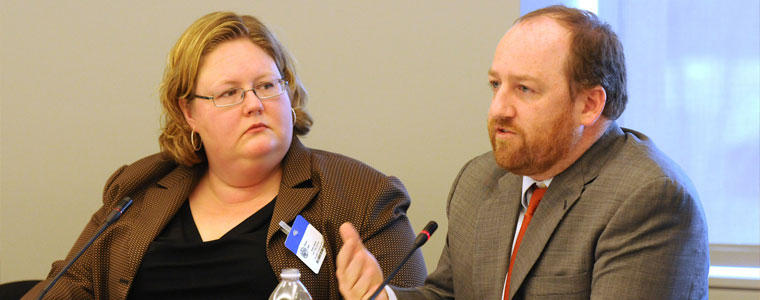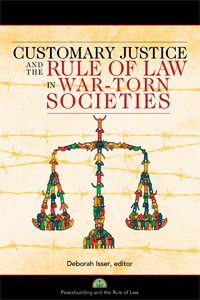Book Launch: Customary Justice and Rule of Law in War-Torn Societies
Customary Justice and Rule of Law in War-Torn Societies presents seven in-depth case studies that take a broad interdisciplinary approach to the study of the justice system. USIP brought together policymakers and practitioners to discuss the ways in which recent rule of law innovations plays a role in resolving many justice reform issues.
Read the event coverage, Customary Law Plays Critical Role in Countries in Conflict, Experts Say


Citizens of fragile and conflict-affected states confront threats to their security and livelihoods on a daily basis. Nearly 1.6 billion people are forced to live in the midst of violence perpetuated by a diverse array of actors - from political extremists to transnational criminal syndicates. Too often these most vulnerable and marginalized are left without a voice in their personal and political future and are denied adequate forums for addressing their grievances.
The United States Institute of Peace leads the way in developing innovative thinking about rule of law in fragile and conflict-affected countries. USIP Press Books' most recent publication - Customary Justice and Rule of Law in War-Torn Societies - moves the field toward empirically-based solutions to justice reform issues, by expanding the justice landscape to look at the evolving role that non-state actors play in resolving conflicts in communities and providing forums for locally relevant outlets of justice.
Many challenging questions remain: How do we turn lessons learned into actions that engage and empower local communities to establish justice and the rule of law? How do we transition from knowledge development to knowledge deployment using the information gained through observation of mission failures and mission successes over the last 10 years? Is a hands-on or hands-off approach from governments and international organizations most effective in empowering sustainable reform? And, how can the international community make its efforts to support and strengthen the rule of law worldwide more effective?
The United States Institute of Peace brought together rule of law practitioners from the field and policymakers from Washington, DC to discuss these critical issues.
Read the News Feature about the event.
Speakers
- Veronica Isala Eragu Bichetero, discussant
Jennings Randolph Senior Fellow
United States Institute of Peace - Karen Hall, discussant
Rule of Law Team Lead - Afghanistan
Department of State - Bureau of International Narcotics and Law Enforcement Affairs - Shelley Inglis, discussant
Policy Advisor-Team Leader
Rule of Law: Access to Justice and Security, Democratic Governance Group
United Nations Development Programme - Deborah Isser, Book Editor
Senior Counsel in the Justice Reform Practice Group
World Bank - Scott Worden, discussant
Senior Policy Advisor in the Office of Afghanistan and Pakistan Affairs
United States Agency for International Development - Hamid Khan, moderator
Senior Program Officer, Rule of Law Center
United States Institute of Peace
Event Photos
Explore Further
- USIP Press Book: Customary Justice and the Rule of Law in War-torn Societies
- Rule of Law Center
- Read Jason Gluck's PeaceBrief on Extending Libya's Transitional Period
- Libyan Official Calls for Libyan Lead in Transition at USIP event



